Workout Eating Philosophy
Eating before, during and after a workout is the prevailing wisdom of the day in order to maintain a healthy body. The foods we eat convert to energy to keep our bodies functioning. The simple science is that what we consume gets broken down into three categories, proteins, carbohydrates and fats. By chewing our food we allow our digestive system to conduct a process that reduces food into molecules (glycogen). During this process, food is sorted into basically two categories; one of usefulness (immediately or for storage in the muscles, liver and fatty acid) and one of waste. Then this glycogen is transported throughout the body to the organs, and tissues via the bloodstream in order to fuel the body much like gas/petrol does for our cars. Please note that we can go three weeks or so without food, but only approximately 2-3 days without water. So, hydration plays a major part for a healthy digestive system.
In cases where we do not supply our bodies with food for long periods of time (72 hours) the body goes into starvation mode. Only a small amount of carbohydrates can be stored in the body. Once glucose is depleted, the body has to look for other sources of energy. Our muscles will begin to shrink and our metabolism will slow down in order to preserve as much energy as possible. At this time, the liver’s supply of glycogen is also utilized, but when its supply is low, the body enters a state of ketosis, this is when ketones are produced by fatty acid. These ketones are used as energy, but the brain cannot live on fatty acids forever.
In the case of a workout, undue stress is being placed on our bodies beyond normal daily functions, causing it to quickly use up our supply. Therefore, we must keep our energy supplies well stocked for use. How each individual accomplishes this is entirely determined by our unique make-up, genetics, age, health, exertion rate, etc.
A good way of looking at the prevailing rule of eating something before and after a workout is that the body needs to ‘chew’ on something for energy. That something should be food and not vital organs, muscle, and tissue.
Isn’t Swimming Different From Other Types of Workouts?
Yes, it is. In order to understand why this is true, we must look at the best posture for digesting foods. Lying face down after we eat can make the food we’ve ingested come back up leaking into the 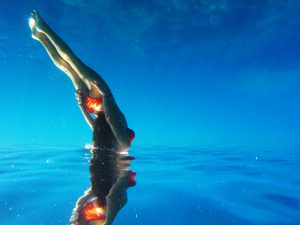 stomach and esophagus, says https://www.everydayhealth.com…. Swimmers lie prone in the water, the very position that is not conducive to proper digestion. Coupled with ingesting chlorinated water (in pools), we are increasing our gastric influx reaction, and other digestion problems. This is obviously not an ideal situation. One that many swimmers suffer from and would do anything to avoid including not eating at all before a swim, especially morning swimmers. Swimmers have often complained that because their food doesn’t seem to go down fast enough, they experience cramping, heartburn, gastroenteritis or nausea, etc. What is a swimmer to do? Should a swimmer eat prior to going swimming or not?
stomach and esophagus, says https://www.everydayhealth.com…. Swimmers lie prone in the water, the very position that is not conducive to proper digestion. Coupled with ingesting chlorinated water (in pools), we are increasing our gastric influx reaction, and other digestion problems. This is obviously not an ideal situation. One that many swimmers suffer from and would do anything to avoid including not eating at all before a swim, especially morning swimmers. Swimmers have often complained that because their food doesn’t seem to go down fast enough, they experience cramping, heartburn, gastroenteritis or nausea, etc. What is a swimmer to do? Should a swimmer eat prior to going swimming or not?
For Eating Before Swimming, Testing the Water is Important
Just as we stick our toe in to test the temperature of the water, we can similarly do so in  determining how we should eat before and after swimming. If you eat a regular balanced breakfast before your morning swim or a full dinner before your evening swim and do not have any negative effects, chances are, what you are consuming before your swim is beneficial. However, if you eat so much as a raisin before going swimming and experience a bad reaction, than you may not be the type of person who can handle food before a swim. In that case, allow yourself enough time to eat and digest your food before you go swimming. Also, the type of food ingested is a factor. Try to eat foods that are more easily digestible. If you haven’t done so already, try running your own a self test.
determining how we should eat before and after swimming. If you eat a regular balanced breakfast before your morning swim or a full dinner before your evening swim and do not have any negative effects, chances are, what you are consuming before your swim is beneficial. However, if you eat so much as a raisin before going swimming and experience a bad reaction, than you may not be the type of person who can handle food before a swim. In that case, allow yourself enough time to eat and digest your food before you go swimming. Also, the type of food ingested is a factor. Try to eat foods that are more easily digestible. If you haven’t done so already, try running your own a self test.
Suggestions On What to Eat Before a Swim
The science is clear that we should eat before working out (that includes a swim), as described above, so what are some choices of foods? Fortunately, there are some tasty meals and treats that can sustain, nourish and that can be digested quickly. LiveStrong.com has a nice list that not only summarizes a healthy diet, but gives information about foods to avoid as well.
Healthy Digestible Foods to Eat Before a Swim (This is not a complete listing):
- Fresh Fruit/Vegetables
- Yogurt
- Applesauce
- Whole grains
- Skinless chicken
Let’s Look at What Olympic Swimmers Eat
 We understand the principles of basic nutrition for all humans. Now, let’s look at what exceptional athletes do to fuel their bodies, namely Michael Phelps. According to FoxNews, it’s a 12,000 calorie per day diet that he uses to keep up his energy during training. The U.S. Food and Drug Administration rates his consumption as 3-4 times more than recommended. His breakfast menu:
We understand the principles of basic nutrition for all humans. Now, let’s look at what exceptional athletes do to fuel their bodies, namely Michael Phelps. According to FoxNews, it’s a 12,000 calorie per day diet that he uses to keep up his energy during training. The U.S. Food and Drug Administration rates his consumption as 3-4 times more than recommended. His breakfast menu:
- three fried egg sandwiches with cheese, lettuce, tomatoes, fried onions, and mayo
- one five-egg omelets
- a bowl of grits
- three slices of French toast with powdered sugar
- three chocolate chip pancakes
- two cups of coffee
Michael Phelp’s morning breakfast is posted here only to illustrate the amount of energy needed for a world-class swimmer exercising lap drills, and weight training in order for him to feel well nourished. Of course, this is not the correct diet for a causal swimmer. With this meal plan, a recreational swimmer would be producing more energy than they would be using. The more exertion and wear and tear on the body, the more nutrition needed to keep it fueled and healthy. As always, consult your physician to determine precisely how much energy (consumption of food) you need for your swim workout.
Locker Room Talk
Parents may not know what to do with their little swimmers before and after a swim. Kids have to be pulled from the water because they say they have tummy aches, etc., while swimming. What is
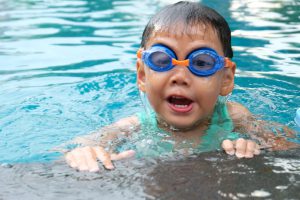
a parent to do? It may not seem like such a great idea to test the water with your child. Some parents have learned what to do the hard way through simple trial and error. Try starting off with a lite snack before a swim with your child. It’s easier to introduce additional food throughout than to overfeed them beforehand and hope for the best.
I hope you have enjoyed this post and that it has been helpful. Please leave a comment below and tell me about your technique of eating before going swimming. We’d love to hear from you.


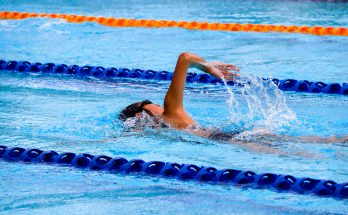
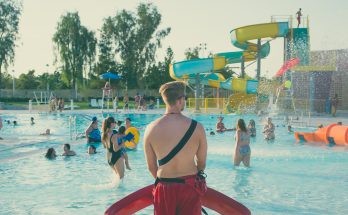
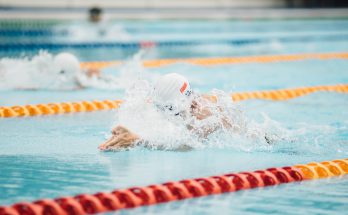
Hey Beverly. Thanks for your great post. I used to swim like 5 hours and get fever after that. I thought swim was just not my thing. But after reading this post, I realized it might caused from the way I eat. Is it?
Mardhian, your issue is a complex one, but I’ll try to simplify it. If the fevers you had were accompanied with nausea, headaches, etc., it could be from an infection, possibly from unclean water. Unclean water could be in a private or public pool, or even in a lake. If the fevers came with fatigue without other symptoms, you could just be overly tired, meaning you need to replenish your electrolytes and GET SOME SLEEP! Either way, nutrition and overall healthy habits do play a part in your wellness. Obviously, a doctor would need to be consulted in both cases. As a swimmer, I’d say, swim for shorter periods of time (5 hours is a long time) and try to take in as little water as possible especially through the mouth. Please let me know when you begin swimming again how it goes. It’s such a great way to stay in shape! It would be a shame not to continue.